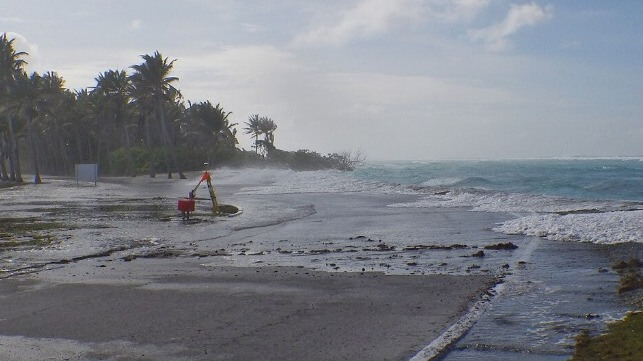For Indo-Pac Islands, Sea Level Matters More Than US-China Rivalry

With an ever-increasing focus on the Indo-Pacific, new dimensions of geopolitical unity and rivalry continue to emerge. The trilateral security partnership between Australia, the U.K and the U.S. (AUKUS submarine deal) is a case in point. The goal of the partnership is to act as a deterrent against China’s surging aggression in the region.
But in the midst of this great power competition, are small island nations within the Indo-Pacific involved in setting the agenda for the region? Indeed, these island nations have critical interests that must be respected for stability and inclusive development of the Indo-Pacific’s littoral countries.
This is the thrust of a new discussion by Carnegie Endowment for International Peace fellows Darshana Baruah and Nitya Labh.
“The United States, China, India, and others have crafted maritime strategies toward the Indian and Pacific Oceans. But island nations in these oceans - from Sri Lanka to Solomon Islands - are often ignored. They are not at the fore-front of the Indo-Pacific agenda, despite it being very much about and influenced by them,” argue Baruah and Nitya.
Last year, during the second annual Indo-Pacific Islands Dialogue in New York, Maldives Foreign Affairs Minister Abdulla Shahid gave a powerful speech on the agency of island nations in key decisions concerning the Indo-Pacific.
“It is not the size that matters or determines the scale of contribution to the international community. Island states can stand shoulder to shoulder with the rest of the global community, and have equal rights and say to their peer nations,” said Shahid.
The key concern is that the agency of the island nations is being drowned out by the intense great power competition and strategic rivalry in the Indo-Pacific. There is already asymmetry in the interests of island nations and the other global powers jockeying for influence in the Indo-Pacific.
As for island nations, most of which are considered ‘big ocean states’, they view climate action as the single most important priority for the Indo-Pacific. On the other hand, the U.S and its regional partners - Australia, France, Japan and India - are concerned with China’s rising naval presence in the Indo-Pacific, a likely threat to security interests in the region.
However, the UN resolution this week asking the International Court of Justice (ICJ) to deliver an opinion judgement on the obligation of States with respect to climate change, could introduce a new shift in multilateral relations within the Indo-Pacific.
The resolution is a culmination of a four-year push led by Vanuatu and other Pacific nations. It could make it possible to hold accountable the high carbon emitting nations for climate emergencies happening around the world.
The vote came in a day after the Biden administration approved the auction of over 73 million acres of Gulf of Mexico for oil and gas drilling. In early March, the U.S. government also approved another multi-decade long oil and gas drilling program in Alaska. These decisions have drawn widespread condemnation from environmental groups, with some arguing they create the largest “carbon bombs” in the United States.
The Intergovernmental Panel on Climate Change’s newly released Sixth Assessment Report (AR6) highlights phasing out fossil fuels as one of the most critical climate actions.
While the ICJ’s opinion will be non-binding, it is a significant milestone in trying to establish climate action obligations under international law. Countries such as Vanuatu argue that their geography is increasingly becoming a disadvantage in the face of the mounting climate crisis. The slow-paced global deliberations on climate action also offer no help in mitigating the risk.
In this regard, Pacific Island nations treat climate change as a matter of national security. Thus, regional cooperation in the Indo-Pacific should first recognize the magnitude of climate emergencies to the sovereignty of the island nations.

that matters most
Get the latest maritime news delivered to your inbox daily.
As Fiji’s Former Ambassador and Permanent Representative to UN Satyendra Prasad has argued, great power competition means less to anyone whose community is slipping beneath the rising sea.
“The greatest threat we face isn’t geopolitics, it is climate change,” Prasad emphasized.
The opinions expressed herein are the author's and not necessarily those of The Maritime Executive.
